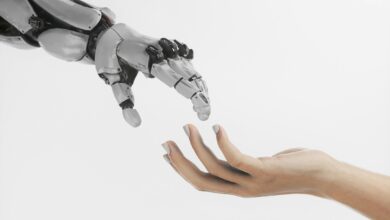
Everyone’s worried AI will take their job. But what if that’s the wrong question entirely?
The future of work isn’t about whether *you* will be replaced. It’s about whether your *skills* will still matter when AI becomes a teammate, not a threat.
This isn’t a small shift. It’s the kind of change that separates Netflix from Blockbuster. And if you’re still trying to improve the old model instead of building the new one, you’re already behind.
Here are the skills that will define whether you thrive, stall, or vanish in the AI economy:
AI Fluency ≠ Coding Skills
The world doesn’t need another Python course. It needs people who can see how to *apply* AI to real business problems—without getting stuck in the weeds.
AI fluency means knowing how to think *with* AI. Not as a gimmick, but as a partner in clarity. You don’t need to know how the algorithm works. You need to know how *you* work, and how to direct AI toward outcomes that matter.
It’s not about syntax. It’s about systems thinking. Can you see where the friction is? Can you delegate it to AI? Can you build a better flow?
That’s fluency.
Judgment x Prompting = Strategic Leverage
AI is like a mirror. It reflects the quality of your thinking back at you. Garbage in? Garbage out. That’s why the skill isn’t in *talking* to AI—it’s in *thinking* clearly enough to ask powerful questions.
Prompting isn’t just a technique. It’s a test of your judgment.
Here’s the secret: the real leverage is knowing the outcome you want, then reverse-engineering the prompts to get you there.
This is what separates operators from leaders. Leaders use AI to pressure-test ideas, explore nuance, and gain perspective at speed. They don’t use it to avoid thinking. They use it to *deepen* it.
This Isn’t an Upgrade—It’s a Revolution
You don’t win this game by improving Blockbuster. You win by inventing Netflix.
Too many people are using AI to patch the old way of working: “Let’s automate this process.” “Let’s write emails faster.” Sure. But that’s not transformation. That’s efficiency theatre.
The real opportunity is to *rethink* what work even is. What your team looks like. What your clients expect. What role you play when machines can think, write, and act.
We don’t need more people stuck in optimization mode. We need those bold enough to redesign the game.
Leadership = Systems Thinking
In the AI era, leadership isn’t about knowing everything. It’s about seeing how everything fits together.
The best leaders aren’t just good communicators or visionaries. They’re architects. They know what to automate, what to delegate, and what needs a human soul.
They design their business like an ecosystem—one where AI carries the load it’s best suited for, while humans do the things only humans can do: inspire, connect, decide.
That means your real value isn’t in your output. It’s in your *oversight*.
If you can spot the bottleneck, design the system, and point AI in the right direction—you’re not
replaceable. You’re essential.
The Skills That Still Matter
The AI economy isn’t coming. It’s already here. The question is: Will you cling to skills that made sense last decade, or build the ones that shape the next?
The future belongs to those who can:
Think strategically Communicate clearly Design systems Lead with vision
If you’re willing to see AI not as the threat but as the upgrade, you’ll stop worrying about being replaced.
You’ll start replacing the old way of doing business.




